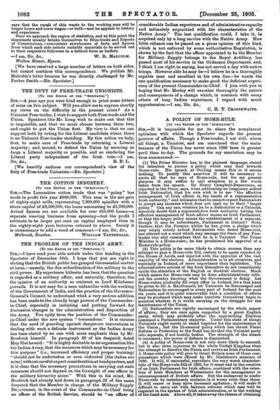[To THE EDITOR OF THE "SPECTATOR. "] have read your able
article under this heading in the Spectator of December 16th. I hope that you are right in stating that the British public has grasped the essential matter at issue,—namely, the due subordination of the military to the civil power. My experience hitherto has been that the question is regarded as a military affair, and naturally, therefore, the the opinion of an authority so eminent as Lord Kitchener prevails. It is not easy for a man unfamiliar with the working of the Government of India, and the practice of the Governor- General's Council, to understand what a very serious addition has been made to the already large powers of the Commander- in-Chief, especially in initiating and putting forward for discussion changes in the administration and disposition of the Army. You aptly term the position of the Commander- in-Chief under the new system " tremendous." It is curious- that the need of guarding against dangerous innovations in dealing with such a delicate instrument as the Indian Army has been stated by no one with more emphasis than by Mr. Brodrick himself. In paragraph 26 of his despatch dated May 31st he said : "It is highly desirable in an organisation like the IndianArmy, that the measures which may be necessary for this purpose " (i.e., increased efficiency and proper training) " should not be undertaken or even indicated [the italics are mine] without careful expert consideration at headquarters, and it is clear that the necessary precautions in carrying out such measures should not depend on the foresight of one officer in the military hierarchy alone." With this in his mind, Mr. Brodrick had already laid down in paragraph 23 of the same despatch that the Member in charge of the Military Supply Department, in the event of the Commander-in-Chief being an officer of the British Service, should be " an officer of considerable Indian experience and of administrative capacity and intimately acquainted with the characteristics of the Native Army." The last qualification could, I take it, be acquired only by a long service with the Native Army. How little reliance can be placed on a pious opinion of this kind, which is not enforced by some authoritative Regulation, is shown by the fact that the officer appointed to be the Member for Military Supply belongs to the Royal Artillery, has passed most of his service in the Ordnance Department, and, I think I am right in saying, has not served a day with native troops. However able he may be—I believe he is a thoroughly capable man and excellent in his own line—he wants the one qualification necessary to make good the deficient experi- ence of the present Commander-in-Chief. I join with you in hoping that Mr. Morley will examine thoroughly the nature and consequences of a change which, in common with many others of long Indian experience, I regard with much apprehension. -I am, Sir, &c., C. H. T. CROSTHWAITE.






































 Previous page
Previous page